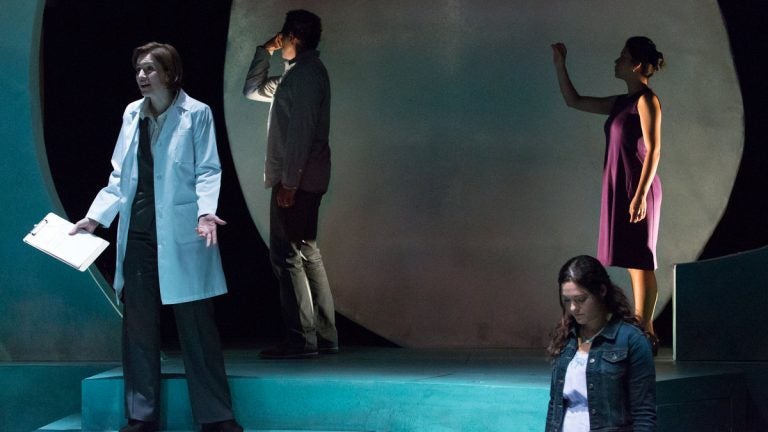Review: ‘Informed Consent’ and the power of creation stories

In the Lantern Theater production of 'Informed Consent
It taxes credibility and has a cheap ending to boot, but we’re going to have to overlook the weak points in Deborah Zoe Laufer’s “Informed Consent” for the things it explores very well: bioethics, and the chasm between creation stories and science. It’s being performed by Lantern Theater in a no-nonsense way, yet director Kathryn MacMillan’s production may have served the play better if its stiff tone — particularly that of its leading character — were softened.
Even so, “Informed Consent” puts us in the middle of a real ethical quandary: If a scientist has data that challenges — even overwhelms — an ethnic group’s beliefs about its origins, where do the responsibilities lie? With science, which could be used to improve the group’s lot? Or with the group, whose order has depended on its beliefs for centuries?
Laufer bases her story on real events, but the problem is that these important issues are linked with other conflicts among the fictional characters in the play, which trips over its own complications. Essentially, “Informed Consent” is the story of a genetic anthropologist — a scientist who uses genome mapping in her research. She must get permission from a tribe in the Grand Canyon to do this sort of work — the “informed consent” that is the play’s title.
The tribe believes she’s doing what her university sent her there to do: take their blood — which they see as sacred and not hers to sample — in order to study why they’re exponentially dying of complications from diabetes. The scientist, bowled over by the idea that DNA can show us both our past and future, also wants to use that blood to trace where the tribes-people came from.
For their part, the people are sure where they came from — the waters at the bottom of the Grand Canyon, their own version of a Garden of Eden and more. And they don’t want scientists (whom they never wanted to deal with in the first place) intruding.
The scientist, played with unbending rigidity by Kittson O’Neill, is the play’s major problem. She’s so obsessed with the potential of genome mapping and its facts (the possibility that mutant DNA can help us cure diseases) and theories (all of us tracing back to a single person), she espouses science 24/7. She’s a stick figure. “We’re all cousins!” she tells everyone who’ll listen, and calls them that in general conversation. “They have the third highest incidence of Type 2 diabetes in the world!” she exclaims excitedly about the tribe she’ll study. Replies her husband: “Maybe you shouldn’t sound so happy about it.”
At a kids’ birthday party her four-year old is attending, the scientist ignores her daughter and proselytizes among the moms — some of them agree to submit to gene sequencing for clues to conditions that might kill them later in life. She herself has one — adult onset Alzheimer’s, which also killed her mother. Could it kill her daughter? Would it pay to know? How is this all linked to the tribe, its diabetes, and the scientist’s possible duplicity in dealing with the tribe’s members?
Issues, plenty of them, and questions too. Laufer uses smart devices to build the play’s several sub-plots — in one of the best, the other four actors (Samantha Bowling, Justin Jain, Maria Konstantinidis, and Lindsay Smiling) not only play many parts but serve as a modern Greek chorus, commenting and suggesting. And when it comes to conversations, Laufer is masterly; I thought about the well-crafted scenes long after the show ended. About the play’s ending — it represents a complete change of heart, mind and context, with Author’s Message written all over feel-good dialogue. Telling you more than that would make me a spoiler about a play that up to that point, is a serious attempt to thrust us into an ethical quandary that comes with new scientific discoveries.
——“Informed Consent,” produced by Lantern Theater Company, runs through Feb. 12 at St. Stephen’s Theater, off 10th Street between Market and Chestnut Streets. 215-829-0395 or lanterntheater.org.
WHYY is your source for fact-based, in-depth journalism and information. As a nonprofit organization, we rely on financial support from readers like you. Please give today.




